Our Top Picks
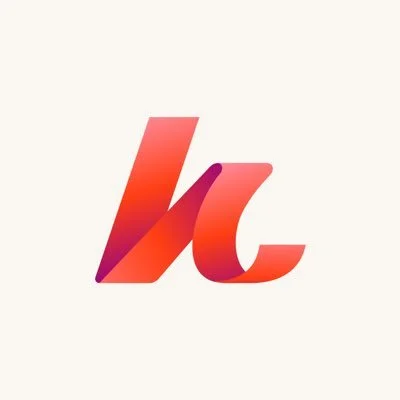
- Create, market, and sell courses and products
- Set up email campaigns
- Design your own website
- Easy payment processing

- Create courses with quizzes and videos
- Design pages to sell your courses
- Set up affiliate marketing
- Monitor student progress
- Build and sell courses and digital products
- Offer exclusive content to members
- Send newsletters and promotions
- No transaction fees on sales
Looking for the best online course platforms to power your learning journey?
Whether you want to pick up a new skill, start a side hustle, or dive deeper into a subject you love, choosing the right platform can make all the difference. With so many options out there, it can be tough to know where to start.
That’s why we’ve rounded up the top online course platforms to help you find the perfect fit for your goals. Let’s get in and explore which ones stand out for flexibility, ease of use, and great course variety!
Best Online Course Platforms in 2025
Check the list of top trending online course platforms in the market below.
#1. Graphy
Graphy is an emerging all-in-one platform designed to help creators build and sell online courses with ease. It’s packed with powerful features that make creating and managing courses a breeze.
What sets Graphy apart is its focus on not only course creation but also community building, which is essential for engaging students in the learning process.

Key Features:
- Simple drag-and-drop course builder with multimedia support
- Membership options that allow creators to build communities around their content
- Integrated marketing tools like email automation and landing page builders
- Analytics dashboard for tracking course performance and student engagement
Pros
- User-friendly and beginner-friendly interface
- Strong focus on community-building to boost student engagement
- Integrated tools for marketing and sales
Cons
- The platform’s integrations are not as extensive as some other competitors
- The feature set is still expanding and may not meet all advanced needs
#2. Kajabi
Kajabi is a leading online course platform known for its all-in-one capabilities.
It’s particularly beneficial for entrepreneurs who want to create and sell online courses while also handling the marketing, sales, and customer relationship management.
Kajabi is a robust platform that allows creators to design stunning courses, set up automated marketing campaigns, and manage everything in one place.
Key Features:
- Course creation with advanced features like drip content, quizzes, and assessments
- Built-in website and landing page builder to promote courses
- Comprehensive marketing tools like email automation, sales funnels, and affiliate marketing
- Integrated payment gateways and membership site capabilities
Pros
- Powerful all-in-one solution for course creation, marketing, and sales
- Excellent customer support and a large knowledge base
- Professional-looking websites and landing pages
Cons
- Higher pricing tiers make it less affordable for beginners
- The platform's array of features can be overwhelming for new users
#3. Podia
Podia is an all-in-one online learning platform for the generation of content and courses while creating a market to sell them under your own brand with a standalone courses platform and managing analytical reporting for the same all in one place.
Key Features
- Drag-and-drop course builder with multimedia support
- Digital product sales and membership site capabilities
- Email marketing and affiliate program management
- Integrated payment processing with no transaction fees
Pros
- Built-in course authoring, publishing and management.
- Provides interactive content with learners portal.
- Content library and user management.
Cons
- Lack of collaboration tools
- Limitation of multi-hosts and on-demand webinars.
#4. Teachable
Teachable is an awesome online course platform where you’ll have access to everything you could ever need to create and sell online courses and coaching—the stress-free platform makes it easy—tech skills or no tech skills.
It's one of the best online course platforms with certificates, and you can generate a certificate as soon as a student finishes the course.
Key Features
- Drag-and-drop course builder with quizzes, surveys, and multimedia content
- Customizable sales pages and checkout processes
- Built-in affiliate marketing and marketing automation
- Student management tools and course analytics
Pros
- Assessment of certificates
- Built-in course authoring and blended learning.
- Real-time data reporting and broadcasting
- Self-paced courses and training administration
Cons
- Lack of analytical reporting
- No feature of single sign-on
#5. Thinkific
Thinkific is one of the best online course platforms for creators who want a complete set of tools to create, market, and sell their courses.
The platform offers a lot of flexibility, making it easy for creators to design personalized learning experiences.
Thinkific also stands out for its strong community features, which allow instructors to engage students in meaningful ways beyond just delivering course content.

Key Features
- Drag-and-drop course builder with no coding required
- Live lessons and webinars to engage with students in real time
- Student community-building tools, such as private discussion forums and virtual spaces
- Full e-commerce suite, including payment processing, tax management, and invoicing
Pros
- Provides API Integrations
- Class scheduling and certification and licensing
- Self-paced courses and provision for single sign-on
- Provides gamification of content
Cons
- Lacks multimedia support
- Limitations in user management
#6. Learnworlds
Learnworlds stands out from the crowd with its powerful interactive course creation tools, multimedia support, and flexible customization options.
It's ideal for course creators who want to deliver highly engaging learning experiences.
Learnworlds is great for instructors who want to provide more interactive, hands-on content for students, including gamified elements and in-depth analytics.
Key Features:
- Interactive video and quizzes to enhance student engagement
- Full-featured course builder with multimedia content support
- Advanced student tracking and analytics tools
- White-label branding for a professional, branded experience
Pros
- Built-in learning management system (LMS)
- Various content publishing options
- Drag and drop builder with customizable templates
- Instructor-led interactive course content and learning
Cons
- Lacks gamification of content
- Limitation of a CRM system
- No blended courses or learning.
#7. Kartra
Kartra is a powerful all-in-one business platform that integrates course creation, marketing, and sales tools.
It’s designed for course creators who want to take their business to the next level, offering advanced features for marketing automation, email marketing, and affiliate programs.
If you're looking to build an entire online business around your courses, Kartra might be the right choice for you.
Key Features:
- Course creation with multimedia support and drip content
- Marketing automation tools, including email campaigns and sales funnels
- Integrated affiliate program management
- Website and landing page builder for branding and promotion
Pros
- Provides A/B Testing
- API Integrations with Kajabi, Google Calendar, Stripe, and PayPal, among others.
- Affiliate management and CRM services.
- Campaign scheduling, tracking, and management.
Cons
- Lack of multi-channel communication and live chat.
- Limitations in real-time updates and pipeline management.
#8. Systeme.io
Systeme.io is a user-friendly and affordable all-in-one platform for building online courses and sales funnels.
It’s ideal for creators who want an affordable solution that offers a range of tools to build their courses and market them effectively.
With its simple design and automation features, it's a solid choice for creators on a budget.
Key Features:
- Course creation with automated content delivery
- Sales funnel builder and email marketing automation
- Affiliate program management and membership features
- Integrated payment processing
Pros
- Drag and drop editor for website building
- Sales and marketing funnels for high conversion rate
- Affiliation program management
- Integrate your course access with payments from your sales funnels and websites
- Give timed access to your course via our drip feature
Cons
- Limited customization
- No Third-Party Integration
- Complex site navigation
#9. Teachfloor
Teachfloor is built for cohort-based learning, making it perfect for course creators who want to engage students in a more collaborative and interactive way.
If you’re offering a cohort-based course or live training program, Teachfloor allows you to manage your cohorts, run live sessions, and create a sense of community for your students.

Key Features:
- Cohort-based course management with real-time interaction
- Live sessions and group discussions
- Customizable course pages and branding
- Student progress tracking and engagement features
Pros
- Curriculum builder for the ease of scheduling
- Provides an interactive dashboard for analytics
- Collaboration tools for multiple instructors
- Peer reviews and student reports
Cons
- Lack of gamification of content
- Limitations in sales and marketing automation
#10. New Zenler
New Zenler is a comprehensive platform for course creation, marketing, and sales.
It offers a range of features that can help you build professional-looking courses and effectively market them to your audience.
It’s perfect for creators who want to combine course creation with a fully integrated business solution.
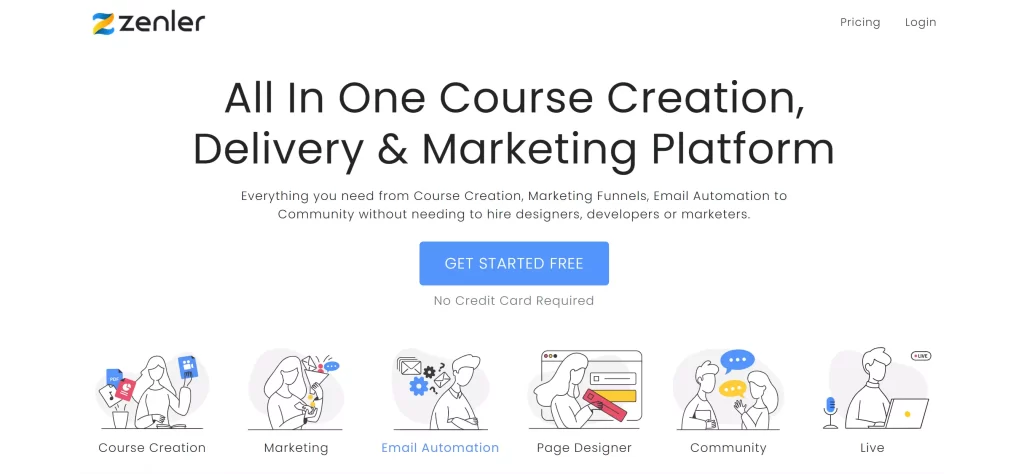
Key Features
- Course creation with multimedia content, quizzes, and assessments
- Email marketing, automation, and sales funnels
- Membership site functionality and live webinars
- Customizable landing pages and sales pages
Pros
- Provides advanced tracking system
- Centralized control for the user
- Page editor with diverse and powerful tools
- An optimized and well-managed community-building
Cons
- A steep learning curve even with an automated system
- Lack of mobile application features
#11. Xperiencify
Xperiencify is a unique platform focused on creating highly interactive, gamified learning experiences.
It’s designed for creators who want to engage their students with fun, interactive content that keeps them coming back.
If you're looking to take your courses to the next level with immersive learning, Xperiencify offers the tools you need.

Key Features
- Gamified course creation tools and interactive learning paths
- Personalized student journeys and progress tracking
- Marketing and sales funnel tools for course promotion
- Built-in email marketing and customer engagement features
Pros
- The experience engine provides a deep learning management system
- Provides a powerful built-in CRM system
- Gamification of content enhances the user experience as a whole
- The reach out tool optimizes the engagement of the students or audience.
Cons
- The navigation can be technical which creates a learning curve for the user
- Hindrances in course creation and learning
- Limitations in API integrations
Essential Features to Look for in an Online Course Platform
When choosing a platform for creating and selling online courses, there are key features that will make the experience easier and more effective for both course creators and students.
Here's a breakdown of the most important features to consider:
1. Content and Contact Management
- Course Content Access: Easy access to create, schedule, and manage course materials (e.g., videos, quizzes).
- Member Management: Track student progress, subscriptions, payments, and feedback.
2. Seamless Interface
- User-Friendly: A smooth and easy-to-navigate interface for both creators and students.
- Effortless Content Creation: The platform should make creating and managing courses simple and intuitive.
3. Powerful Page Editor
- Customizable Templates: Tools to easily design and personalize course pages with forms, quizzes, and content.
- Engaging Content Creation: Build attractive, interactive content quickly.
4. Collaboration Tools
- Team Interaction: Tools to help creators, partners, and collaborators work together easily.
- Customer & Partner Communication: Engage with students, subscribers, and team members in a shared space.
5. Integrations
- Third-Party Integrations: Connect with other apps like CRM, LMS, CMS, payment gateways, social media, and scheduling tools.
- Automation & Data Sync: Streamline processes and share data between platforms seamlessly.
These features will ensure you have a comprehensive, easy-to-manage platform for creating, marketing, and selling your courses efficiently.
Comparison of Best Online Course Platforms
While choosing the best online course platforms, always consider your basic requirements. See what you need the most in your platform and how you want to serve your students.
With many online learning platforms, it's always difficult to select the best, but here is a quick comparison table for you.
| Platform | Key Benefits |
|---|---|
| Kajabi | Provides a range of content creation and management tools. |
| Podia | It provides gamification features and an experience engine to create content and online courses. |
| Teachable | Best features and tools with unlimited students and courses for a free plan. |
| Thinkific | Provides best integrations for community building and engagement. |
| Learnworlds | Offers an intuitive learning and management system. |
| Kartra | Best marketing and sales automation and affiliation system. |
| Systeme.io | Provides a set of features for creating sales funnels. |
| Teachfloor | A cohort-based course developer and content management system. |
| New Zenler | Offers a unified platform for campaign, content and marketing management. |
| Xperiencify | Offers a unified platform for campaign, content, and marketing management. |
Quicklinks:
- Best Membership Site Platforms
- Best Webinar Platforms (Ratings & Reviews)
- Best Ad Networks for Publishers
- Graphy Review: Best Course Platform For Indian Coaches?
- Thinkific Review: Is it the Best Course Builder?
FAQs
Q1. How do I create an online course?
Creating an online course is now easily possible with the assistance of an online course platform where you can use the interactive dashboard and widgets to generate courses. From creating to selling the course in the market, the course platform can help you through and through.
Q2. How Much Do Online Course Platforms Cost?
Online course platforms offer different features and hence can cost a diverse range of pricing, starting as low as $24/month to as high as $399/month, depending on your plan. Some platforms also offer free plans with unlimited students and courses.
Q3. What Kind of Features Do Online Course Platforms Have?
Online course platforms provide a wide range of interactive and powerful editing features such as page editor, drag and drop builder, form builder, drip content, sales and marketing funnels, online payments, communities, and much more.
Q.4: Which platform is best for selling digital products along with courses?
Kajabi and Systeme.io offer built-in tools for selling both courses and digital products.
Q.5: Do these platforms support mobile access for students?
Most top platforms, including Learnworlds and Kajabi, are mobile-friendly or offer native apps.







